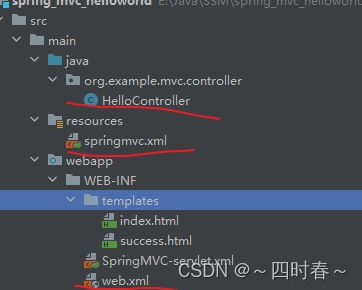- Springboot使用itext及documents4j操作pdf(word转pdf、pdf加水印(文字或图片,可指定位置)、pdf加密(打开密码,编辑密码))
爱编程的小飞哥
SpringBootjavaitext
pom.xml引入com.documents4jdocuments4j-local1.0.3com.documents4jdocuments4j-transformer-msoffice-word1.0.3com.itextpdfitextpdf5.5.11com.itextpdfitext-asian5.2.0创建PDF操作工具类PdfUtilspackagecom.ruoyi.common.u
- 学习111
麋鹿叔叔
学习
项目名称项目简介主要功能技术原理GitHub地址browser-use智能浏览器工具,让AI像人类一样操作浏览器,实现网页自动化网页浏览与操作、多标签页管理、视觉识别与内容提取、操作记录与重复执行、自定义动作支持、主流LLM模型支持为大语言模型服务的创新Python工具库GitHubEkoFellouAI推出的生产就绪型JavaScript框架,基于自然语言驱动创建智能代理支持所有平台,提供统一便
- 3.19学习总结
2402_88131930
学习
学习了Java中的面向对象的知识点完成一道算法题,找树左下角的值,错误的以为左下角只能是最底层的左节点,但指的是最底层最左边的节点
- 【从零开始学习JAVA】异常体系介绍
Cools0613
从0开始学Java学习
前言:本文我们将为大家介绍一下异常的整个体系,而我们学习异常,不是为了敲代码的时候不出异常,而是为了能够熟练的处理异常,如何解决代码中的异常。异常的两大分类:我们就以这张图作为线索来详细介绍一下Java中的异常:1.Exceptions(异常)在Java中,Exception(异常)是一种表示非致命错误或异常情况的类或接口。Exception通常是由应用程序引发的,可以被程序员捕获、处理或抛出。E
- android sqlite 数据库简单封装示例(java)
mmsx
android作业源码分享java数据库android
sqlite数据库简单封装示例,使用记事本数据库表进行示例。首先继承SQLiteOpenHelper使用sql语句进行创建一张表。publicclassnoteDBHelperextendsSQLiteOpenHelper{publicnoteDBHelper(Contextcontext,Stringname,SQLiteDatabase.CursorFactoryfactory,intvers
- java工程师常用开发工具
Monika Zhang
开发工具java
背景:最近换新电脑,记录下本岗位需要安装的软件,也顺便给大家参考,欢迎各位留言补充1JDK(JavaDevelopmentKit)JDK是Java程序员开发Java应用程序所必需的软件包。下载地址:JavaDownloads|Oracle安装配置教程:window下win10jdk8安装与环境变量的配置(超级详细)_jdk8环境变量配置-CSDN博客目前主流的JDK版本还是JAVA8查看版本命令:
- PHP与Java的区别分析
Monika Zhang
java架构设计phpjava开发语言
一、语言特点php:一种的像Python的动态弱语言类型的服务器脚本语言,不需要编译代码;它是专为Web开发目的而开发和设计的,而且简单容易上手。Java:是一种通用的面向对象编程语言,属于强势优选语言类型,在执行前必须先正确编译。是面向对象的和人类可读的;支持服务器端和客户端;可用于开发独立应用程序或基于Web的应用程序,上手比PHP难。二、语法1.PHP是一种脚本语言,代码在服务器上执行,而结
- Android 12.0 WiFi连接流程分析之IP地址分配流程
安卓兼职framework应用工程师
android12.0Rom开发疑难问题分析androidtcp/ipwifi连接ip地址分配ip
1.前言在12.0的系统rom定制化开发中,对于wifi的定制功能也是比较多的,在关于wifi连接流程模块的分析,了解整个wifi连接流程也是非常重要的,接下来看下wifi的连接流程分析下相关功能实现2.WiFi连接流程分析之IP地址分配流程的核心类frameworks/opt/net/wifi/service/java/com/android/server/wifi/ClientModeImpl
- Maven简介
z迦在线
mavenjava
Maven简介Maven是Apache软件基金会的一个开源项目,是一个优秀的项目构建工具,它用来帮助开发者管理项目中的jar,以及jar之间的依赖关系、完成项目的编译(.java--->.class)、测试、打包(源代码--->.jar文件)和发布等工作。Maven是如何管理项目中的jar文件的?Maven简化了Java项目中的JAR文件管理,主要通过以下几个关键点:POM文件:Maven使用po
- 如何对关键字段进行脱敏(一)在使用Mybatis-plus执行查询
张瀚元782738120
mybatisjava
为了在读取用户表中的mobile字段时进行脱敏处理,并实现一个通用的方法以便将来对其他字段例如:邮箱、身份证、姓名等进行脱敏处理,可以采用以下步骤:1.添加依赖首先,在pom.xml文件中添加必要的依赖,包括SpringBoot、MyBatis-Plus和Hutool工具库:org.springframework.bootspring-boot-starter-webcom.baomidoumyb
- Spring系列学习之Spring Messaging消息支持
m0_74825488
面试学习路线阿里巴巴springlinqjava
英文原文:https://docs.spring.io/spring-boot/docs/current/reference/html/boot-features-messaging.html目录JMSActiveMQ支持Artemis支持使用JNDIConnectionFactory发送消息接收消息AMQPRabbitMQ支持发送消息接收消息ApacheKafka支持发送消息接收消息Kafka流
- Java基础 3.22
anlogic
javajava开发语言jvm
1.break练习//1-100之内的数求和,求当和第一次大于20的当前数ipublicclassBreak01{publicstaticvoidmain(String[]args){intn=0;intcount=0;for(inti=1;i20){n=i;System.out.println("和大于20,退出循环,当前i为"+n);break;}}}}//实现登录验证,有3次机会,如果用户名
- 【SpringBoot】MorningBox小程序的完整后端接口文档
爱因斯坦乐
springboot小程序java
以下是「晨光宅配」小程序的完整接口文档,涵盖了所有12个表的接口。每个接口包括请求方法、URL、请求参数、响应格式和示例接口文档1.用户模块1.1获取用户信息URL:/user/{userId}方法:GET请求参数:userId(路径参数):用户ID响应格式:{"userId":1,"openid":"openid_123456","phone":"13800138000","nickname":
- 《java面向对象(5)》<不含基本语法>
java小白板
java开发语言
本笔记基于黑马程序员java教程整理,仅供参考1.异常1.1异常分类1.1.1Error指系统级别的错误,程序员无法解决,不必理会1.1.2Exception(异常)分为两类:RuntimeException:运行时异常,编译时程序不会报错,运行时报错,如数组越界其他异常:编译时异常,编译时就会报错运行时异常:publicclassText{publicstaticvoidmain(String[
- Oracle数据库与Java全栈开发一篇搞定(指南式教学)
Aphelios380
Oracle数据库oraclejava
一、基础操作篇1.数据定义语言(DDL)核心操作1.1表结构设计技巧--电商用户表设计示例CREATETABLEtb_users(user_idNUMBER(10)PRIMARYKEY,usernameVARCHAR2(30)UNIQUENOTNULL,passwordCHAR(32)DEFAULT'e10adc3949ba59abbe56e057f20f883e',emailVARCHAR2(5
- 在 Spring Boot 结合 MyBatis 的项目中,实现字段脱敏(如手机号、身份证号、银行卡号等敏感信息的部分隐藏)可以通过以下方案实现
冷冷清清中的风风火火
笔记springbootspringbootmybatis后端
在SpringBoot结合MyBatis的项目中,实现字段脱敏(如手机号、身份证号、银行卡号等敏感信息的部分隐藏)可以通过以下方案实现。以下是分步说明和完整代码示例:一、实现方案选择1.方案一:自定义注解+Jackson序列化脱敏适用场景:数据返回给前端时动态脱敏,数据库存储原始数据。优点:无侵入性,通过注解灵活控制脱敏字段,与业务逻辑解耦。核心实现:利用Jackson的JsonSerialize
- 5、Spring Boot 3.x 集成 RabbitMQ
Kenny.志
java-rabbitmqspringbootrabbitmq
一、前言本篇主要是围绕着SpringBoot3.x与RabbitMQ的集成,这边文章比较简单,RabbitMQ的集成没有太大的变化,这篇文章主要是为了后续的RabbitMQ的动态配置做铺垫。1、Docker安装RabbitMQ2、SpringBoot3.x集成RabbitMQ二、Docker安装RabbitMQ1、创建docker-network#创建docker网络,方便后续连通多个容器dock
- Javascript基础
GesLuck
javascript开发语言ecmascript
目录1.变量声明2.基本数据类型3.复杂数据类型4.字符串方法5.对象方法6.时间方法7.条件(if)8.循环(for/while)9.遍历(forin/of)10.多选(Switch)END1.变量声明const:除非变量需要重新赋值(优先使用)——consta=true;let:需要修改值时使用{大括号内用}(其次使用)——letb="hello"var:除非维护旧代码(避免使用)——varc
- Java学习------常用类String
日暮南城故里
Java学习记录java学习开发语言String类
1.介绍Java中的String属于引用数据类型,Java专门在堆中准备了一个字符串常量池。我们在开发时,字符串使用的频率是很高的,因此将这些字符串放在常量池中可以省去对象的创建过程,提高效率。常量池属于一种缓存技术,缓存技术是一种可以提高程序执行效率的手段。Strings1=“hello”;Strings2=“hello”;System.out.println(s1==s2);//这里输出的结果
- Eclipse 快捷键
lsx202406
开发语言
Eclipse快捷键Eclipse是一款功能强大的集成开发环境(IDE),广泛应用于Java开发领域。熟练掌握Eclipse的快捷键可以大大提高开发效率。本文将详细介绍Eclipse中一些常用的快捷键,帮助开发者更快地熟悉和使用Eclipse。1.基础操作1.1打开文件Ctrl+O:快速打开文件Ctrl+Shift+O:查找类或文件1.2保存文件Ctrl+S:保存当前文件1.3运行程序Ctrl+F
- github如何为开源项目作出贡献
PXM的算法星球
github开源
就在昨天,笔者取得了第一次开源项目贡献,虽然更新的内容很小,但是也算是迈出了第一步1.选择合适的开源项目(1)兴趣优先选择自己感兴趣的项目会更有动力参与,比如你喜欢前端开发,可以关注React、Vue相关的开源项目;如果喜欢后端,可以尝试贡献Django、SpringBoot等项目。(2)关注活跃度一个活跃的开源项目通常意味着更快的反馈和更友好的开发者社区。你可以通过以下方式判断:Issue更新频
- Spring AOP相关常见问题
PXM的算法星球
Java后端springjava数据库
前言在日常开发中,我们经常需要给方法添加一些横切关注点(Cross-CuttingConcerns),比如日志记录、事务管理、权限控制等。而SpringAOP(Aspect-OrientedProgramming,面向切面编程)提供了一种优雅的方式,让我们可以在不修改业务代码的情况下增强方法行为。1.AOP和OOP的区别是什么?许多初学者会疑惑,OOP(面向对象编程)已经很好地组织了代码,为什么还
- 测试工程师Ai应用实战指南简例prompt
进击的雷神
prompt
阅读原文以下是一个真实具体的案例,展示测试工程师如何在不同阶段结合DeepSeek提升效率。案例基于电商平台"订单超时自动关闭"功能测试:案例背景项目名称:电商平台订单系统V2.3测试目标:验证"用户下单后30分钟未支付,订单自动关闭并释放库存"功能技术栈:SpringBoot+MySQL+Redis延迟队列1.需求分析阶段痛点:需求文档仅描述业务逻辑,未明确异常场景(如服务器时间不同步、Redi
- JavaScript 箭头函数使用总结及注意事项(适合新手到进阶)
我真聪明。
javascript开发语言ecmascript
箭头函数(=>)是ES6的核心特性之一,它简化了函数写法并改变了this的指向逻辑,但在使用时需要明确其适用场景和限制。以下是详细总结:一、箭头函数核心特点简洁语法://传统函数constadd=function(a,b){returna+b;};//箭头函数constadd=(a,b)=>a+b;//单行省略returnconstadd=(a,b)=>{returna+b;};//多行需显式re
- spring boot 三步集成rabbitmq
PXM的算法星球
Java后端java-rabbitmqspringbootrabbitmq
引入依赖org.springframework.bootspring-boot-starter-amqp编写config类@ConfigurationpublicclassRabbitmqConfig{publicstaticfinalStringRECORD_QUEUE="teaching-assistant-record_queue";@BeanpublicJackson2JsonMessag
- Spring Boot 3.2+ 升级Mybatis-Plus 3.5.x 兼容性问题与解决方案Invalid value type for attribute ‘factoryBeanObjectT
z2637305611
springbootmybatis后端
一、当升级遭遇滑铁卢当我们将SpringBoot升级到3.2.0+版本时,熟悉的Invalidvaluetypeforattribute'factoryBeanObjectType':java.lang.String错误突然吞噬了控制台。这个看似神秘的错误频繁出现在整合Mybatis-Plus3.5.x时,甚至会附赠Invalidbeandefinitionwithname'xxxMapper'的
- JAVA泛型的作用
时光呢
javawindowspython
1.类型安全(TypeSafety)在泛型出现之前,集合类(如ArrayList、HashMap)只能存储Object类型元素,导致以下问题:问题:从集合中取出元素时,需手动强制类型转换,容易因类型不匹配导致运行时错误(如ClassCastException)。//JDK1.4时代:非泛型示例Listlist=newArrayList();list.add("Hello");Integer
- 使用 React 和 Cypress 进行单元测试
pxr007
单元测试react.jsjunit
每个开发人员都希望发布一个没有错误的生产应用程序。为了实现这一点,我们需要考虑如何将测试集成到我们的应用程序中。我们可以使用许多测试工具、框架和测试类型。Cypress是一个现代化的自动化测试套件。它是一个基于JavaScript的完全开源的测试框架,由Mocha和Chai等支持BDD和TDD断言样式的库构建。此外,如果您熟悉用JavaScript编写测试,那么使用Cypress会很容易。Cypr
- 无锁并发环形队列(Java版)
呆呆的蜗牛
数据结构和算法队列java多线程
环形队列是顺序队列的一种。普通的顺序队列,当队列不满且tail指针移动到数组的最后位置时,就需要将数组中的元素整体向前搬移,而环形队列却不用。这就提高了入队的效率。无锁并发主要基于CAS原理,在java中Unsafe类中提供了底层的CAS操作。但是我们可以不直接操作Unsafe类,JDK提供了一系列的Atomic类来满足一般的无锁需求。importjava.util.concurrent.atom
- Stream 流中 flatMap 方法详解
遇见伯灵说
Java开发语言javastream流
1.flatMap()到底是啥?flatMap()是Stream里的中间操作,它的作用可以分两步理解:第一步:对流里的每个元素,先**映射(转换)**成一个Stream。第二步:把多个子流拍平成一个大的扁平流。简单记忆:map()是一对一,flatMap()是一对多。️2.基础用法拆解来看个例子:Listlist=List.of("HelloWorld","JavaStream");Listres
- 关于旗正规则引擎下载页面需要弹窗保存到本地目录的问题
何必如此
jsp超链接文件下载窗口
生成下载页面是需要选择“录入提交页面”,生成之后默认的下载页面<a>标签超链接为:<a href="<%=root_stimage%>stimage/image.jsp?filename=<%=strfile234%>&attachname=<%=java.net.URLEncoder.encode(file234filesourc
- 【Spark九十八】Standalone Cluster Mode下的资源调度源代码分析
bit1129
cluster
在分析源代码之前,首先对Standalone Cluster Mode的资源调度有一个基本的认识:
首先,运行一个Application需要Driver进程和一组Executor进程。在Standalone Cluster Mode下,Driver和Executor都是在Master的监护下给Worker发消息创建(Driver进程和Executor进程都需要分配内存和CPU,这就需要Maste
- linux上独立安装部署spark
daizj
linux安装spark1.4部署
下面讲一下linux上安装spark,以 Standalone Mode 安装
1)首先安装JDK
下载JDK:jdk-7u79-linux-x64.tar.gz ,版本是1.7以上都行,解压 tar -zxvf jdk-7u79-linux-x64.tar.gz
然后配置 ~/.bashrc&nb
- Java 字节码之解析一
周凡杨
java字节码javap
一: Java 字节代码的组织形式
类文件 {
OxCAFEBABE ,小版本号,大版本号,常量池大小,常量池数组,访问控制标记,当前类信息,父类信息,实现的接口个数,实现的接口信息数组,域个数,域信息数组,方法个数,方法信息数组,属性个数,属性信息数组
}
&nbs
- java各种小工具代码
g21121
java
1.数组转换成List
import java.util.Arrays;
Arrays.asList(Object[] obj); 2.判断一个String型是否有值
import org.springframework.util.StringUtils;
if (StringUtils.hasText(str)) 3.判断一个List是否有值
import org.spring
- 加快FineReport报表设计的几个心得体会
老A不折腾
finereport
一、从远程服务器大批量取数进行表样设计时,最好按“列顺序”取一个“空的SQL语句”,这样可提高设计速度。否则每次设计时模板均要从远程读取数据,速度相当慢!!
二、找一个富文本编辑软件(如NOTEPAD+)编辑SQL语句,这样会很好地检查语法。有时候带参数较多检查语法复杂时,结合FineReport中生成的日志,再找一个第三方数据库访问软件(如PL/SQL)进行数据检索,可以很快定位语法错误。
- mysql linux启动与停止
墙头上一根草
如何启动/停止/重启MySQL一、启动方式1、使用 service 启动:service mysqld start2、使用 mysqld 脚本启动:/etc/inint.d/mysqld start3、使用 safe_mysqld 启动:safe_mysqld&二、停止1、使用 service 启动:service mysqld stop2、使用 mysqld 脚本启动:/etc/inin
- Spring中事务管理浅谈
aijuans
spring事务管理
Spring中事务管理浅谈
By Tony Jiang@2012-1-20 Spring中对事务的声明式管理
拿一个XML举例
[html]
view plain
copy
print
?
<?xml version="1.0" encoding="UTF-8"?>&nb
- php中隐形字符65279(utf-8的BOM头)问题
alxw4616
php中隐形字符65279(utf-8的BOM头)问题
今天遇到一个问题. php输出JSON 前端在解析时发生问题:parsererror.
调试:
1.仔细对比字符串发现字符串拼写正确.怀疑是 非打印字符的问题.
2.逐一将字符串还原为unicode编码. 发现在字符串头的位置出现了一个 65279的非打印字符.
- 调用对象是否需要传递对象(初学者一定要注意这个问题)
百合不是茶
对象的传递与调用技巧
类和对象的简单的复习,在做项目的过程中有时候不知道怎样来调用类创建的对象,简单的几个类可以看清楚,一般在项目中创建十几个类往往就不知道怎么来看
为了以后能够看清楚,现在来回顾一下类和对象的创建,对象的调用和传递(前面写过一篇)
类和对象的基础概念:
JAVA中万事万物都是类 类有字段(属性),方法,嵌套类和嵌套接
- JDK1.5 AtomicLong实例
bijian1013
javathreadjava多线程AtomicLong
JDK1.5 AtomicLong实例
类 AtomicLong
可以用原子方式更新的 long 值。有关原子变量属性的描述,请参阅 java.util.concurrent.atomic 包规范。AtomicLong 可用在应用程序中(如以原子方式增加的序列号),并且不能用于替换 Long。但是,此类确实扩展了 Number,允许那些处理基于数字类的工具和实用工具进行统一访问。
- 自定义的RPC的Java实现
bijian1013
javarpc
网上看到纯java实现的RPC,很不错。
RPC的全名Remote Process Call,即远程过程调用。使用RPC,可以像使用本地的程序一样使用远程服务器上的程序。下面是一个简单的RPC 调用实例,从中可以看到RPC如何
- 【RPC框架Hessian一】Hessian RPC Hello World
bit1129
Hello world
什么是Hessian
The Hessian binary web service protocol makes web services usable without requiring a large framework, and without learning yet another alphabet soup of protocols. Because it is a binary p
- 【Spark九十五】Spark Shell操作Spark SQL
bit1129
shell
在Spark Shell上,通过创建HiveContext可以直接进行Hive操作
1. 操作Hive中已存在的表
[hadoop@hadoop bin]$ ./spark-shell
Spark assembly has been built with Hive, including Datanucleus jars on classpath
Welcom
- F5 往header加入客户端的ip
ronin47
when HTTP_RESPONSE {if {[HTTP::is_redirect]}{ HTTP::header replace Location [string map {:port/ /} [HTTP::header value Location]]HTTP::header replace Lo
- java-61-在数组中,数字减去它右边(注意是右边)的数字得到一个数对之差. 求所有数对之差的最大值。例如在数组{2, 4, 1, 16, 7, 5,
bylijinnan
java
思路来自:
http://zhedahht.blog.163.com/blog/static/2541117420116135376632/
写了个java版的
public class GreatestLeftRightDiff {
/**
* Q61.在数组中,数字减去它右边(注意是右边)的数字得到一个数对之差。
* 求所有数对之差的最大值。例如在数组
- mongoDB 索引
开窍的石头
mongoDB索引
在这一节中我们讲讲在mongo中如何创建索引
得到当前查询的索引信息
db.user.find(_id:12).explain();
cursor: basicCoursor 指的是没有索引
&
- [硬件和系统]迎峰度夏
comsci
系统
从这几天的气温来看,今年夏天的高温天气可能会维持在一个比较长的时间内
所以,从现在开始准备渡过炎热的夏天。。。。
每间房屋要有一个落地电风扇,一个空调(空调的功率和房间的面积有密切的关系)
坐的,躺的地方要有凉垫,床上要有凉席
电脑的机箱
- 基于ThinkPHP开发的公司官网
cuiyadll
行业系统
后端基于ThinkPHP,前端基于jQuery和BootstrapCo.MZ 企业系统
轻量级企业网站管理系统
运行环境:PHP5.3+, MySQL5.0
系统预览
系统下载:http://www.tecmz.com
预览地址:http://co.tecmz.com
各种设备自适应
响应式的网站设计能够对用户产生友好度,并且对于
- Transaction and redelivery in JMS (JMS的事务和失败消息重发机制)
darrenzhu
jms事务承认MQacknowledge
JMS Message Delivery Reliability and Acknowledgement Patterns
http://wso2.com/library/articles/2013/01/jms-message-delivery-reliability-acknowledgement-patterns/
Transaction and redelivery in
- Centos添加硬盘完全教程
dcj3sjt126com
linuxcentoshardware
Linux的硬盘识别:
sda 表示第1块SCSI硬盘
hda 表示第1块IDE硬盘
scd0 表示第1个USB光驱
一般使用“fdisk -l”命
- yii2 restful web服务路由
dcj3sjt126com
PHPyii2
路由
随着资源和控制器类准备,您可以使用URL如 http://localhost/index.php?r=user/create访问资源,类似于你可以用正常的Web应用程序做法。
在实践中,你通常要用美观的URL并采取有优势的HTTP动词。 例如,请求POST /users意味着访问user/create动作。 这可以很容易地通过配置urlManager应用程序组件来完成 如下所示
- MongoDB查询(4)——游标和分页[八]
eksliang
mongodbMongoDB游标MongoDB深分页
转载请出自出处:http://eksliang.iteye.com/blog/2177567 一、游标
数据库使用游标返回find的执行结果。客户端对游标的实现通常能够对最终结果进行有效控制,从shell中定义一个游标非常简单,就是将查询结果分配给一个变量(用var声明的变量就是局部变量),便创建了一个游标,如下所示:
> var
- Activity的四种启动模式和onNewIntent()
gundumw100
android
Android中Activity启动模式详解
在Android中每个界面都是一个Activity,切换界面操作其实是多个不同Activity之间的实例化操作。在Android中Activity的启动模式决定了Activity的启动运行方式。
Android总Activity的启动模式分为四种:
Activity启动模式设置:
<acti
- 攻城狮送女友的CSS3生日蛋糕
ini
htmlWebhtml5csscss3
在线预览:http://keleyi.com/keleyi/phtml/html5/29.htm
代码如下:
<!DOCTYPE html>
<html>
<head>
<meta charset="UTF-8">
<title>攻城狮送女友的CSS3生日蛋糕-柯乐义<
- 读源码学Servlet(1)GenericServlet 源码分析
jzinfo
tomcatWebservlet网络应用网络协议
Servlet API的核心就是javax.servlet.Servlet接口,所有的Servlet 类(抽象的或者自己写的)都必须实现这个接口。在Servlet接口中定义了5个方法,其中有3个方法是由Servlet 容器在Servlet的生命周期的不同阶段来调用的特定方法。
先看javax.servlet.servlet接口源码:
package
- JAVA进阶:VO(DTO)与PO(DAO)之间的转换
snoopy7713
javaVOHibernatepo
PO即 Persistence Object VO即 Value Object
VO和PO的主要区别在于: VO是独立的Java Object。 PO是由Hibernate纳入其实体容器(Entity Map)的对象,它代表了与数据库中某条记录对应的Hibernate实体,PO的变化在事务提交时将反应到实际数据库中。
实际上,这个VO被用作Data Transfer
- mongodb group by date 聚合查询日期 统计每天数据(信息量)
qiaolevip
每天进步一点点学习永无止境mongodb纵观千象
/* 1 */
{
"_id" : ObjectId("557ac1e2153c43c320393d9d"),
"msgType" : "text",
"sendTime" : ISODate("2015-06-12T11:26:26.000Z")
- java之18天 常用的类(一)
Luob.
MathDateSystemRuntimeRundom
System类
import java.util.Properties;
/**
* System:
* out:标准输出,默认是控制台
* in:标准输入,默认是键盘
*
* 描述系统的一些信息
* 获取系统的属性信息:Properties getProperties();
*
*
*
*/
public class Sy
- maven
wuai
maven
1、安装maven:解压缩、添加M2_HOME、添加环境变量path
2、创建maven_home文件夹,创建项目mvn_ch01,在其下面建立src、pom.xml,在src下面简历main、test、main下面建立java文件夹
3、编写类,在java文件夹下面依照类的包逐层创建文件夹,将此类放入最后一级文件夹
4、进入mvn_ch01
4.1、mvn compile ,执行后会在
